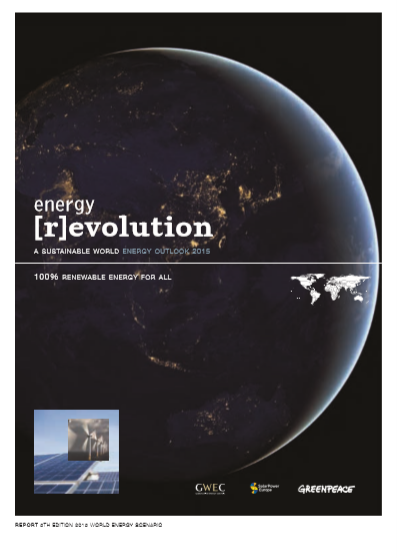energy [r]evolution: a sustainable world energy outlook 2015

Energy [R]evolution scenarios have become a well-known and respected energy analysis since first published in 2005. In the third version of the Energy [R]evolution published in june 2010 in berlin, we reached out to the scientific community to a much larger extent. The IPCC´s Special Report Renewables (SRREN) chose the Energy Revolution as one of the four benchmark scenarios for climate mitigation energy pathways, because it was the most ambitious scenario: combining an uptake of renewable energy and energy efficiency, it put forwards the highest renewable energy share by 2050. following the publication of the SRREN in May 2011 in Abu Dhabi, the ER became a widely quoted energy scenario and is now part of many scientific debates and referenced in numerous scientific peer-reviewed publications.
In March 2015, the Energy [R]evolution received worldwide recognition when a widely circulated report from the uSbased Meister Consultants Group concluded that the rapid market growth of renewable power generation has been largely underestimated and reported that “just about no one saw it coming. The world’s biggest energy agencies, financial institutions, and fossil fuel companies, for the most part, seriously underestimated just how fast the clean power sector could and would grow”. Meister identifies one group that got the market scenario closest to right, however, and it wasn’t the International Energy Agency or Goldman Sachs or the uS Department of Energy (DOE) – it was Greenpeace with the Energy [R]evolution project.
The basic principles and strategic approach of the development of the Energy [R]evolution concepts have not significantly changed since the beginning. They still serve as a basis for scenario modeling. However, the methodology and underlying scientific research about transport technologies and concepts, energy resource assessments, infrastructural requirements, technology developments, and the cost of renewables have been continuously updated and improved. The renewable energy targets have been increased from 50% to 80% and finally to 100% by 2050.
Since the first Energy [R]evolution was published a decade ago, the energy sector has changed significantly. Renewable energy technologies have become mainstream in most countries as a consequence of dramatically reduced costs. A future renewable energy supply is no longer science fiction, but work in progress.
However, the growth rates of renewables – especially in the heating sector and in transport – are far too slow to achieve the energy-related CO2 reductions required to avoid dangerous climate change. A fundamental shift in the way we consume and generate energy must begin immediately and be well under way before 2020 in order to avert the worst impacts of climate change.1 We need to limit global warming to less than 2° Celsius, above which the impacts become devastating.
- Publication date : 18th August, 2013
- Publisher: greenpeace international, global wind energy Council, solarPowereurope Download

